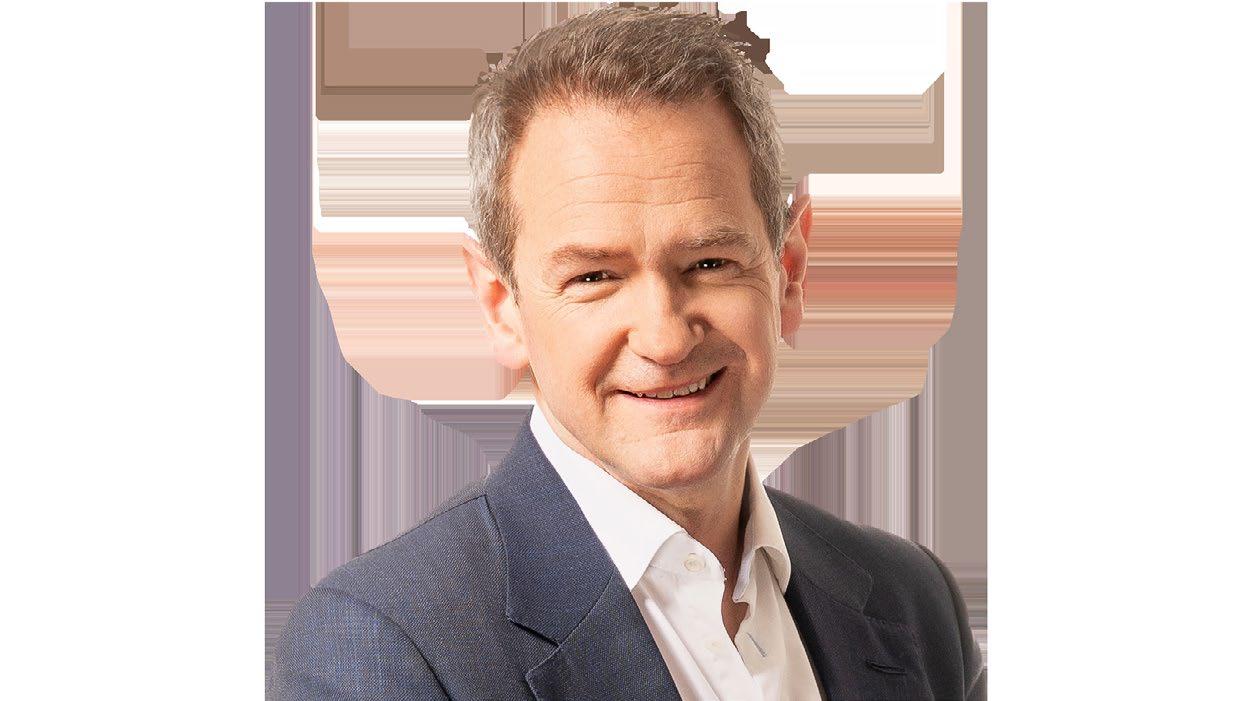










































































































































































































































































































































































































































































































































































































































































































Some pieces have tunes so good and emotions so true that they never stop feeling fresh – and tonight’s concert is full of them. Conductor Han-Na Chang joins the RSNO for Beethoven’s revolutionary Eroica Symphony, the great French cellist Bruno Delepelaire performs Elgar’s quintessentially British Cello Concerto, and there’s also one of the best-known pieces of classical music as the barnstorming opener.

ROSSINI Overture to William Tell [11’]
ELGAR Cello Concerto in E minor Op85 [26’]
BEETHOVEN Symphony No3 in E flat major Op55 Eroica [47’]
Han-Na Chang Conductor
Bruno Delepelaire Cello Royal Scottish National Orchestra
USHER HALL, EDINBURGH
Fri 9 Dec 2022 7.30pm
GLASGOW ROYAL CONCERT HALL
Sat 10 Dec 7.30pm
The Glasgow performance will be recorded for the RSNO Archive. Supported by the Iain and Pamela Sinclair Legacy.
If viewing these notes at the concert, please do so considerately and not during performances. Please silence all mobile telephones and alerts, and refrain from taking photographs, without flash, until the end of each piece.




So far this year over 81,000 children have attended a live RSNO concert or signed up for digital music resources. We want to reach even more
to the RSNO Christmas Appeal and together we can reach and inspire every child in Scotland and beyond.
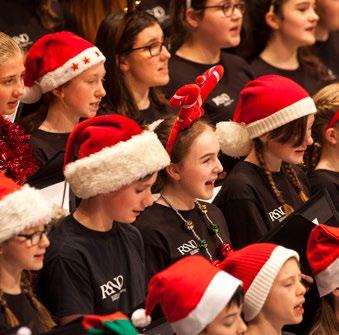
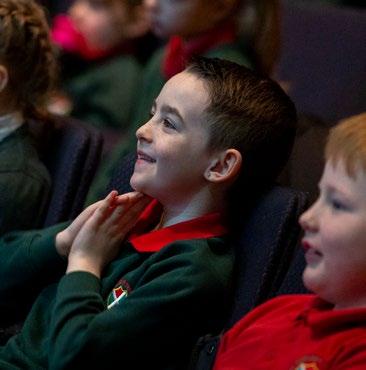

a young person from a low-income household to sing with the RSNO Youth Chorus
sheet music for a nursery pop-up concert
Welcome to this evening ’s concert, which celebrates the cello. I’m delighted that it is conducted by Han-Na Chang, herself a wonderful cello player. With the Philharmonia Orchestra I performed in Lorin Maazel’s Cello Concerto, with Han-Na as soloist. She played the remarkable piece beautifully and it remains a fond memory, despite the challenging trumpet solo!
We welcome back cellist Bruno Delepelaire. Bruno performed Tchaikovsky ’s Rococo Variations at our 21:22 Season Opener, a special performance that was our first Season concert back after the pandemic. Though socially distanced and still wearing masks, it felt at the time like an exciting ‘return to normal’ Happily, things have continued to improve since then.
Beethoven’s Eroica Symphony has in recent times become a significant musical landmark for the RSNO The Orchestra performed the piece in 2020 with Sir Roger Norrington, in a
Season that celebrated the 250th anniversary of Beethoven’s birth. Little did we know that within a month of recording the concert live, we would be broadcasting it as the first of our Friday Night Club lockdown concert streams. Times change quickly, and just as there was comfort in the community that we built watching those first digital broadcasts, I am heartened to hear this timeless piece live on stage again.
Thank you for your continued support. I look forward to seeing you all again as the Season resumes at the end of January. In the meantime, I wish you a restful and happy festive period.
Alistair Mackie CHIEF EXECUTIVE










































































Thomas Søndergård 1
MUSIC DIRECTOR Elim Chan 2
PRINCIPAL GUEST CONDUCTOR Neeme Järvi 3
CONDUCTOR LAUREATE Alexander Lazarev 4 CONDUCTOR EMERITUS Kellen Gray 5
ASSISTANT CONDUCTOR Stephen Doughty 6
CHORUS DIRECTOR, RSNO CHORUS Patrick Barrett 7
CHORUS DIRECTOR, RSNO JUNIOR CHORUS
FIRST VIOLIN
Maya Iwabuchi LEADER 8 Sharon Roffman LEADER 9 Lena Zeliszewska 10
ASSOCIATE LEADER
Tamás Fejes ASSISTANT LEADER 11 Patrick Curlett ASSISTANT PRINCIPAL 12 Caroline Parry 13 Ursula Heidecker Allen 14 Lorna Rough 15 Susannah Lowdon 16 Alan Manson 17 Elizabeth Bamping 18 Liam Lynch 19
SECOND VIOLIN
Jacqueline Speirs 20
ASSOCIATE PRINCIPAL Marion Wilson ASSOCIATE PRINCIPAL 21 Harriet Hunter SUB PRINCIPAL 22 Nigel Mason 23 Wanda Wojtasinska 24 Paul Medd 25 Anne Bünemann 26 Sophie Lang 27 Robin Wilson 28 Emily Nenniger 29
Tom Dunn PRINCIPAL 30 Felix Tanner
ASSOCIATE PRINCIPAL VIOLA 31 Asher Zaccardelli ASSISTANT PRINCIPAL 32 Susan Buchan SUB PRINCIPAL 33 Lisa Rourke SUB PRINCIPAL 34 Nicola McWhirter 35
Claire Dunn 36 Katherine Wren 37 Maria Trittinger 38 Francesca Hunt 39
Betsy Taylor ASSOCIATE PRINCIPAL 40 Kennedy Leitch ASSISTANT PRINCIPAL 41 Rachael Lee 42 Sarah Digger 43 Robert Anderson 44
Margarida Castro 45 ASSOCIATE PRINCIPAL Michael Rae ASSISTANT PRINCIPAL 46 Sally Davis 47 Aaron Berrera Reyes 48
Katherine Bryan PRINCIPAL 49 Helen Brew ASSOCIATE PRINCIPAL 50 Janet Richardson 51 PRINCIPAL PICCOLO
Adrian Wilson PRINCIPAL 52 Peter Dykes ASSOCIATE PRINCIPAL 53 Henry Clay PRINCIPAL COR ANGLAIS 54
Timothy Orpen 54 PRINCIPAL CLARINET Duncan Swindells 56 PRINCIPAL BASS CLARINET
David Hubbard PRINCIPAL 57 Luis Eisen ASSOCIATE PRINCIPAL 58 Paolo Dutto 59 PRINCIPAL CONTRABASSOON
Christopher Gough PRINCIPAL 60 Alison Murray ASSISTANT PRINCIPAL 61 Andrew McLean 62 ASSOCIATE PRINCIPAL David McClenaghan 63 Martin Murphy ASSISTANT PRINCIPAL 64
TRUMPET
Christopher Hart PRINCIPAL 65 Marcus Pope SUB PRINCIPAL 66 Jason Lewis ASSOCIATE PRINCIPAL 67
Dávur Juul Magnussen PRINCIPAL 68 Lance Green ASSOCIATE PRINCIPAL 69 Alastair Sinclair 70 PRINCIPAL BASS TROMBONE
John Whitener PRINCIPAL 71
TIMPANI Paul Philbert PRINCIPAL 72
Simon Lowdon PRINCIPAL 73 John Poulter ASSOCIATE PRINCIPAL 74
no actual cavalry charge in the opera, whose narrative – based on an 1804 play by the great German playwright Friedrich Schiller –describes Tell’s heroic and inspiring resistance to oppression and his eventual triumph.
In every respect the piece is unique in Rossini’s output, and indeed in the operatic repertory as a whole, being not so much an overture as an orchestral tone poem in four sections. These represent (1) a sombre but peaceful rural scene over which (2) a storm bursts, and then clears (3) to allow the local herdsmen to play their folk instruments to call their animals in a traditional Ranz des Vaches, before (4) the galop brings the piece to its exciting conclusion.
Full opera: Paris, 3 August 1829

DURATION Overture: 11 minutes
The overture to Rossini’s opera Guillaume Tell (William Tell) is one of the most famous pieces of orchestral music. For many years its fast final section was used as the theme tune of the long-running US radio series The Lone Ranger and its much-syndicated TV follow-up. In these and the 2013 Hollywood movie starring Armie Hammer and Johnny Depp, a masked figure on a horse rights wrongs in the Wild West with the aid of his Native American sidekick, Tonto.
To some extent this represented an appropriate use of Rossini’s music – even if The Lone Ranger had nothing to do with Switzerland – because Tell and the Lone Ranger both worked selflessly for the common good and with no thought of reward.
This final section of the overture is a galop, a popular dance in late 1820s Paris that emulated the gait of a horse. Its reappearance in Rossini’s overture presumably represents the Swiss patriots on the move, though there’s
William Tell is an immense and highly original opera, and Rossini was obviously keen to create such an individual overture for what he clearly viewed as an important piece – his first entirely new work written for the Paris Opéra. Ironically, William Tell would also turn out to be his last opera, though he lived for a further 30 years –but what a way to go out!
© George Hall
It would be easy to hear Edward Elgar’s Cello Concerto of 1919 as a great musical gasp of grief and horror at the losses and sufferings brought about by the Great War, which had finally ended the previous year. Sombre, introspective and anguished, the work appears to encapsulate what the British public must have been feeling as they quietly surveyed the conflict’s aftermath.
In reality, though, while the war undoubtedly played its part in forming the music’s emotional world, the concerto’s darkly reflective mood probably owes more to the increasing bleakness of the composer’s more immediate personal, social and artistic surroundings.
As Elgar penned the concerto during the summer of 1919, his beloved wife of 30 years, Alice, began her descent into the illness that would claim her life the following spring. He later described her literally ‘fading away before one’s very eyes’.
Socially, Elgar’s beloved Edwardian England was also fading away, as new, more socialist ideals captured the imagination of postwar society. Likewise, new ideals were gathering momentum in the world of music. Across the channel in Paris, 1919 saw the completion of Darius Milhaud’s surrealist ballet The Ox on the Roof, its lively, Brazilian-influenced music playfully sidestepping the traditional rules of harmony. Likewise, Prokofiev’s first two piano concertos – thoroughly modernist of aesthetic, and tonally dissonant – were already a number of years old. Elgar’s implacably tonal, late19th-century style was beginning to sound dated.
Even so, when the concerto received its premiere that autumn at the opening concert of the London Symphony Orchestra’s first postwar season, its intense autumnal beauty
should have won it a warm reception. The fact it didn’t was largely down to the conductor of the rest of the concert, Eric Coates, who had devoted the majority of the rehearsal time to his own favourite work on the programme, Scriabin’s Poem of Ecstasy. The Observer reported afterwards of Elgar’s work:
The orchestra was virtually inaudible, and when just audible was merely a muddle. No one seemed to have any idea of what it was the composer wanted.
Still, even without that Eric Coates-shaped torpedo, it’s possible that the work, as gloriously affecting as it was quickly discovered to be by subsequent audiences, still wouldn’t have met with an ecstatic reception that night, simply due to its mood. Right at that moment, Scriabin’s lushly scored, otherworldly, euphoric music probably delivered the sheer escapism the war-weary audience needed. By contrast, the searing pathos of Elgar’s work might well have hit the national psyche a bit too squarely on the head for an evening that was supposed to be entertainment.
The concerto opens with an impassioned cello solo. This solitary outpouring of emotion is eventually overtaken by a flowing, lyrical theme introduced by the violas, which the cello then picks up. The mood lifts briefly for the central section, but only slightly; when the cello reintroduces the flowing theme as the movement moves towards its climax and close, there’s no perceptible shift in temperament.
The music slips into the second movement without a break, starting off tense and hesitant, with the cello alternating between plucked notes and nervous bowed statements. The orchestra then launches the movement proper
with two sharp woodwind chords, off which the cello immediately bounces and is away, hesitating no more. In the scherzo-like music that follows, full of fast, gossamer-light cello runs, the overarching tension is punctuated by moments of brightness and even humour.
With the slow movement, peace and profundity combine. More than ever the cello dominates, with the orchestra largely the sympathetic background texture. Mournful acceptance appears to be the message of the cello’s intensely lyrical song.
The finale opens with a doom-laden statement from the orchestra, which heralds a cello solo echoing that of the work’s opening. As the movement continues, there are upbeat moments, and even a gentler theme containing glimmers of hope. However, sorrow is never completely out of earshot, meaning it’s no surprise when eventually, towards the end, the music irrevocably darkens. First, the cello reutters a lamenting passage from the Adagio. It follows this with the anguished phrase from the very opening of the concerto. Then, the music swiftly builds to its dramatic conclusion.
© Charlotte GardnerBruno Delepelaire owes the fact that he became a cellist to his grandmother, an enthusiastic amateur cellist. As a five-year-old, he also wanted to learn the instrument. Lessons with his first cello teacher, Erwan Fauré, were formative experiences for him.
Delepelaire later studied at the Paris Conservatoire under Philippe Muller. In 2012 he went to Berlin to continue his training under Jens Peter Maintz at the University of the Arts and under Ludwig Quandt at the Orchestra Academy of the Berliner Philharmoniker, taking up the position of First Solo Cellist of the Berliner Philharmoniker in 2013.
Delepelaire gained orchestral experience with the Verbier Festival Orchestra and Gustav Mahler Youth Orchestra, and as a student of the Orchestra Academy of the Berliner Philharmoniker. As a soloist he has performed with the Berliner Philharmoniker, Bielefelder Philharmoniker, RundfunkSinfonieorchester Saarbrücken, Bayerische Kammerphilharmonie, Berliner Barock Solisten, Württembergische Philharmonie Reutlingen, Münchner Rundfunkorchester, RSNO, BBC Scottish Symphony Orchestra, Orchestre de l’Opéra de Nice and Aalborg Symfoniorkester, under conductors including Semyon Bychkov, Reinhard Goebel, Alexander Kalajdzic, Matthias Pintscher, Michael Sanderling and Thomas Søndergård.
Delepelaire has won several awards, including First Prize at the Karl Davidov International Cello Competition (2012) and the Markneukirchen International Instrumental Competition (2013).
Bruno Delepelaire plays a cello made by Matteo Goffriller, on loan from the Karolina Blaberg Foundation.

Whether Beethoven was ever an unqualified admirer of Napoleon Bonaparte isn’t clear. But at some stage he made the decision to dedicate his ‘Heroic’ Third Symphony to the French Revolution’s self-made generalissimo and world leader. Then, in 1804, when Beethoven learned that Napoleon had proclaimed himself Emperor, he tore out the dedication in fury, shouting:
So he’s just an ordinary being! Now he will trample the rights of men under foot and pander to his own ambition; he will place himself high above his fellow creature and become a tyrant!
Vienna, 7 April 1805 DURATION 47 minutes 1. Allegro con brio
Marcia funebre. Adagio assai 3. Scherzo. Allegro vivace–Trio 4. Finale. Allegro molto–Poco andante–Presto
When the symphony appeared in print two years later, the title page stated simply, ‘Sinfonia eroica, composed in memory of a great man’. That ‘in memory’ is telling: in 1806 Napoleon was still very much alive.
All the same, Beethoven’s belief in heroism and in the possibility of human beings transforming their political destiny proved more robust. It is that belief that remains relevant to the Eroica Symphony. True, the music abounds in triumphal military imagery: the trumpet and drum triplet-taps in the first movement’s final crescendo; the eruptive major-key fanfares at the first big climax of the Marcia funebre (Funeral March); the celebratory horn calls in the trio section of the Scherzo; or the exultant timpani tattoos in the final moments of the Finale. But for many the symphony has more to say about spiritual struggle and liberation –whether in a personal or political sense is for the listener to decide.
The first movement is one of Beethoven’s most truly heroic creations, brilliantly conveying the effect of epic conflict. The development of the opening theme (presented by cellos after

the two sharp opening chords) is so much more than an abstract process: the theme’s adventures in the long movement that follows are more like those of a character in a novel or a play. The movement appears to end in triumph – or at least the promise of triumph; which only makes the contrast with the sombre Funeral March that follows all the more extreme. (One wonders how Napoleon might have reacted to a ‘Bonaparte’ symphony that contained a depiction of his own funeral.) This movement’s emotional range – from dignified mourning, to frenzied hope, to depictions of grief in which the music almost literally ‘breaks down’ – is remarkable; and yet the formal control is as impressive as the power of the feelings expressed.
The Scherzo that follows is one of Beethoven’s most exhilarating symphonic dance movements. The writing for the three horns in the central trio section suggests battlefield celebrations to some, the exuberance of the hunt to others. Then the Finale begins with a terrific orchestral flourish, followed by a skeletal pizzicato figure for strings. Gradually the textures fill out, until the skeletal string figure turns out to be the bass for a joyous theme on high woodwind, then strings. This is the most formally free of the four movements, blending elements of classical variation, sonata form and fugue into a new kind of dynamic superstructure which, at the same time, completes the ‘story’ presented in the first movement. Beethoven knew he had achieved something special here. Years later, in 1817, when asked which was his favourite among his symphonies, he replied without hesitation, ‘The Eroica’.
2 Apr Danish writer Hans Christian Andersen was born
9 May German poet, philosopher and playwright Friedrich Schiller, whose An die Freude (Ode to Joy) Beethoven set to music, died
4 Jun The first Trooping the Colour ceremony was held at Horse Guards Parade, London
9 Jul Muhammad Ali Pasha founded a dynasty in Egypt which ruled until Naguib and Nasser’s army-led coup in 1952
12 Aug Meriwether Lewis became the first white person to reach the Continental Divide of the Americas
16-19 Oct At the Battle of Ulm, Austrian General Mack von Leiberich surrendered his entire army to Napoleon
21 Oct The British fleet defeated a French/Spanish fleet at Trafalgar but its commander, Admiral Horatio Nelson, was fatally shot
14 Nov Fanny Mendelssohn, German composer, pianist and sister of Felix, was born
26 Nov The Pontcysyllte Aqueduct, the world’s highest canal aqueduct at 38m/126ft, taking the Llangollen Canal over the River Dee, opened
12 Dec Henry Wells, co-founder of American Express and the Wells Fargo bank, was born
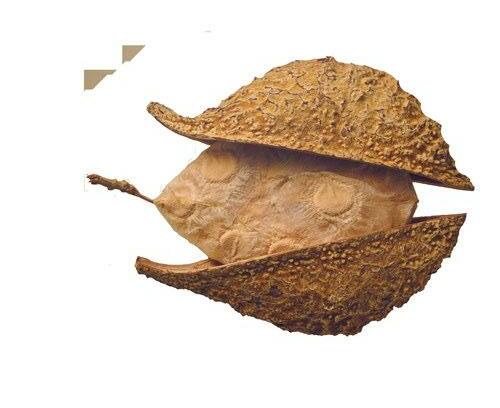


Prior to her appointment as Artistic Leader and Chief Conductor of the Trondheim Symfoniorkester and Opera, Han-Na Chang served as the orchestra’s Principal Guest Conductor from 2013 to 2017. She was Music Director of the Qatar Philharmonic Orchestra for the 2013/14 season, culminating in their critically acclaimed performance at the 2014 BBC Proms. In 2009 she founded the Absolute Classic Festival at Seongnam Arts Center in South Korea and served as its Artistic Director until 2014.
Artistic Leader and Chief Conductor of the Trondheim Symfoniorkester and Opera in Norway since 2017, and Principal Guest Conductor of the Symphoniker Hamburg – Laeiszhalle Orchester from the 2022/23 season, Han-Na Chang’s career spans nearly three decades.
She first gained international recognition for her precocious musical gifts at the age of 11, when she won First Prize and the Contemporary Music Prize at the 1994 Rostropovich International Cello Competition, awarded unanimously by the jury led by Mstislav Rostropovich. Her international career took off, taking her to all the major concert halls and the world’s top orchestras as an indemand recitalist and soloist.
Having developed an interest in and passion for the symphonic repertoire during her late teens and early 20s, Han-Na Chang made her formal conducting debut in 2007, at the age of 24, and since then has focused exclusively on conducting.

As a guest conductor, Han-Na Chang’s upcoming appearances include the Danish National Symphony Orchestra, Rotterdam and Oslo Philharmonic orchestras, and Singapore, Atlanta, Vancouver, Detroit and Milwaukee Symphony orchestras.
Her cello recordings, exclusively for the Warner Music label, have been nominated for GRAMMYs, awarded two ECHO Klassik awards, the Caecilia and Cannes Classical awards and a Gramophone Concerto of the Year accolade.
Han-Na Chang was born in Suwon, South Korea in 1982. At the age of six she received her first cello lesson. Her family moved to New York in 1993 in order to support her continuing studies at the Juilliard School, and she has lived in New York ever since. At the age of ten she also started studying with Mischa Maisky, who remains her most important influence, and she counts Mstislav Rostropovich and Giuseppe Sinopoli among the most influential mentors of her formative years. She read philosophy at Harvard University.
Formed in 1891 as the Scottish Orchestra, the company became the Scottish National Orchestra in 1950, and was awarded Royal Patronage in 1977. The Orchestra’s artistic team is led by Danish conductor Thomas Søndergård, who was appointed RSNO Music Director in October 2018, having previously held the position of Principal Guest Conductor. Hong Kong-born conductor Elim Chan succeeds Søndergård as Principal Guest Conductor.

The RSNO performs across Scotland, including concerts in Glasgow, Edinburgh, Dundee, Aberdeen, Perth and Inverness. The Orchestra appears regularly at the Edinburgh International Festival and the BBC Proms, and has made recent tours to the USA, China and Europe.
The Orchestra is joined for choral performances by the RSNO Chorus, directed by Stephen Doughty. The RSNO Chorus evolved from a choir formed in 1843 to sing the first full performance of Handel’s Messiah in Scotland. Today, the RSNO Chorus is one of the most distinguished large symphonic choruses in Britain. The Chorus has performed nearly every work in the standard choral repertoire, along with contemporary works by composers including John Adams, Howard Shore and Sir James MacMillan.
The RSNO has a worldwide reputation for the quality of its recordings, receiving a 2020 Gramophone Classical Music Award for Chopin’s Piano Concertos (soloist: Benjamin Grosvenor), conducted by Elim Chan; two Diapason d’Or awards for Symphonic Music (Denève/Roussel 2007; Denève/Debussy 2012) and eight GRAMMY Awards nominations. Over 200 releases are available, including Thomas Søndergård conducting Strauss (Ein Heldenleben, Der Rosenkavalier Suite) and Prokofiev (Symphonies Nos1 and 5), the complete symphonies of Sibelius (Gibson), Prokofiev (Järvi), Bruckner (Tintner) and Roussel (Denève), as well as further discs championing the music of William Grant Still (Eisenberg), Xiaogang Ye (Serebrier) and Thomas Wilson (Macdonald).
The RSNO’s pioneering learning and engagement programme, Music for Life, aims to engage the people of Scotland with music across key stages of life: Early Years, Nurseries and Schools, Teenagers and Students, Families, Accessing Lives, Working Lives and Retired and Later Life. The team is committed to placing the Orchestra at the centre of Scottish communities via workshops and annual residencies.
FIRST VIOLIN
Maya Iwabuchi
LEADER
Lena Zeliszewska ASSOCIATE LEADER
Tamás Fejes ASSISTANT LEADER
Patrick Curlett
Yada Lee Liam Lynch Alan Manson
Veronica Marziano Claudia Fuller
Ursula Heidecker Allen
Lorna Rough Caroline Parry Elizabeth Bamping Gemma O’Keeffe
SECOND VIOLIN
Alessandro Ruisi GUEST PRINCIPAL Marion Wilson
Jacqueline Speirs
Anne Bünemann
Paul Medd
Harriet Hunter Sophie Lang Laura Embrey
Sian Holding John Robinson
Kirsty MacLeod Nigel Mason
VIOLA
Tom Dunn
PRINCIPAL Felix Tanner
Lisa Rourke
Claire Dunn
Katherine Wren Maria Trittinger
Francesca Hunt
Sasha Buettner Elaine Koene
Marsailidh Groat
Benjamin Hugues GUEST PRINCIPAL
Betsy Taylor
Kennedy Leitch Rachael Lee Sarah Digger
Robert Anderson Miranda Phythian-Adams Susan Dance
DOUBLE BASS
Margarida Castro ASSOCIATE LEADER Michael Rae Aaron Barrera-Reyes Tom Berry Kirsty Matheson Gabriel Rodrigues
FLUTE
Katherine Bryan PRINCIPAL Janet Richardson PRINCIPAL PICCOLO
OBOE
Adrian Wilson PRINCIPAL Henry Clay PRINCIPAL COR ANGLAIS
CLARINET
Isha Crichlow GUEST PRINCIPAL Duncan Swindells PRINCIPAL BASS CLARINET
BASSOON
David Hubbard PRINCIPAL Paolo Dutto PRINCIPAL CONTRABASSOON
HORN
Andrew McLean
ASSOCIATE PRINCIPAL Alison Murray Martin Murphy David McClenaghan Diana Sheach
TRUMPET
Christopher Hart PRINCIPAL David Carstairs
TROMBONE
Dávur Juul Magnussen PRINCIPAL Lance Green Alastair Sinclair PRINCIPAL BASS TROMBONE
TUBA John Whitener PRINCIPAL
TIMPANI Paul Philbert PRINCIPAL
PERCUSSION
Simon Lowdon PRINCIPAL John Poulter Tom Hunter
The Institut français is the home The Institut français is the home of French of French culture in Scotland. culture in Scotland.
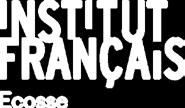
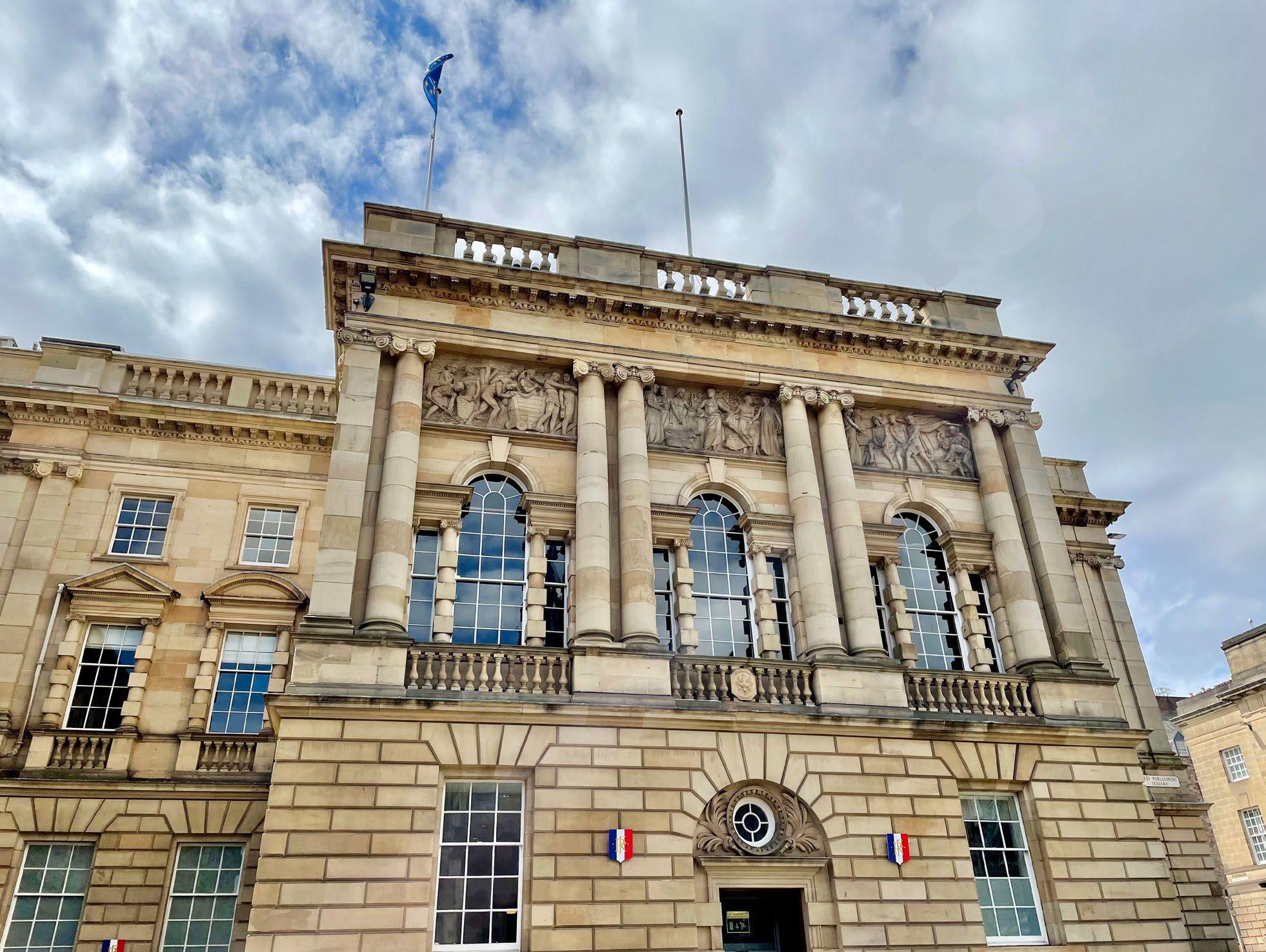
Part of a global network, we Part of a global network, we encourage cross-cultural encourage cross-cultural exchange and present exchange and present the best France has to offer. the best France has to offer.

I am honoured and extremely proud to be Music Director of the RSNO. It is through the continued generosity of you, our friends, donors and supporters, that we can continue to achieve and realise the most ambitious goals of the Orchestra.
One of the wonders of the RSNO is how it brings high-quality music not only to concert halls, but to the wider community. From hospital settings to care homes, from our Astar app for families with newborns to our National Schools Concert Programme, our music touches so many lives in Scotland and beyond.
Your support is the cornerstone of all that we do, as it allows us to continually build and develop.
Thank you for being part of this wonderful Orchestra’s journey, as we adapt and grow towards a bright future.
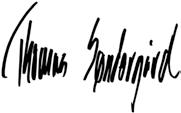
The RSNO Conductors’ Circle is an inspirational group of individual supporters at the heart of the RSNO’s Individual Giving programme. Our members’ annual philanthropic gifts enable us to realise the Orchestra’s most ambitious goals. Conductors’ Circle members support inspirational concert performances for our audiences alongside transformational education programmes in communities across Scotland, via our ground-breaking initiative Music for Life.
The relationship between the RSNO and Conductors’ Circle members involves exceptional levels of access to all aspects of Orchestra life. We design bespoke private events tailored to individual interests and passions, providing insight into the artistic process and bringing our supporters further into the RSNO family. Members of the Conductors’ Circle benefit from an intimate and long-lasting connection with the RSNO Artistic Team and particularly with RSNO Music Director Thomas Søndergård, Principal Guest Conductor Elim Chan and the many
renowned guest Conductors we are privileged to welcome to the RSNO each year. The RSNO is very grateful for the continued support of its Conductors’ Circle:
Ardgowan Charitable Trust Geoff and Mary Ball Sir Ewan and Lady Brown Stina Bruce Jones Ian and Evelyn Crombie Carol Grigor and the Trustees of Dunard Fund Gavin and Kate Gemmell Kenneth and Julia Greig Ms Chris Grace Hartness Kat Heathcote and Iain Macneil Bruce and Caroline Minto David and Alix Stevenson Eric and Karen Young
We would also like to thank those generous donors who wish to remain anonymous.
For more information on Individual Giving and becoming part of the Conductors’ Circle please contact Jenny McNeely at jenny.mcneely@rsno.org.uk
From musical activities in schools with the musicians of the future to working in community venues across Scotland, as a Chair Patron you are enabling RSNO musicians to explore the many facets of their art and the positive impact it has on people’s lives. Supporting an individual musician puts you at the heart of the RSNO family. You’re connected directly to the musicians on stage and get to enjoy privileged behind-the-scenes access. RSNO musicians truly appreciate our Chair Patrons and enjoy developing personal relationships with our supporters.
Assistant Conductor
Kellen Gray
The Solti Foundation Chair
First Violin
Maya Iwabuchi LEADER
Sharon Roffman LEADER Dunard Fund Chair
Tamás Fejes ASSISTANT LEADER
The Bill and Rosalind Gregson Chair
Patrick Curlett
ASSISTANT PRINCIPAL
The RSNO Circle Chair
Alan Manson
The Hugh and Linda Bruce-Watt Chair
Elizabeth Bamping
The WL and Vera Heywood Chair
Ursula Heidecker Allen
The James and Iris Miller Chair
Lorna Rough
The Hilda Munro Chair
Second Violin
Sophie Lang
The Ian and Evelyn Crombie Chair
Viola
Tom Dunn PRINCIPAL
The Cathy & Keith MacGillivray Chair
Lisa Rourke SUB PRINCIPAL
The Meta Ramsay Chair
Francesca Hunt
The Rolf and Celia Thornqvist Chair
Cello
Betsy Taylor
ASSOCIATE PRINCIPAL
The Maxwell Armstrong Chair
Kennedy Leitch
ASSISTANT PRINCIPAL
The David and Anne Smith Chair
Rachael Lee
The Christine and Arthur Hamilton Chair
Double Bass
Michael Rae James Wood Bequest Fund Chair
With thanks to the Gregor Forbes Chair for their support of the RSNO Double Bass section
Flute
Katherine Bryan PRINCIPAL
The David and Anne Smith Chair
Helen Brew ASSISTANT PRINCIPAL The Gordon Fraser Charitable Trust Chair
Oboe
Adrian Wilson PRINCIPAL The Hedley Wright Chair
Peter Dykes
ASSOCIATE PRINCIPAL Witherby Publishing Group Charitable Trust Chair
Cor Anglais
Henry Clay PRINCIPAL
In memory of a dear friend, Fiona H Bassoon
David Hubbard PRINCIPAL The James and Morag Anderson Chair
Horn
Christopher Gough PRINCIPAL
The Springbank Distillers Chair
Martin Murphy
ASSISTANT PRINCIPAL
The John Mather Trust’s Rising Star Chair
Alison Murray
ASSISTANT PRINCIPAL
Mr & Mrs Pierre and Alison Girard
David McClenaghan
The J & A Mitchell Chair
Trumpet
Christopher Hart PRINCIPAL Ms Chris Grace Hartness
Marcus Pope SUB PRINCIPAL The Nigel and Margot Russell Chair
Trombone
Dávur Juul Magnussen
PRINCIPAL The Mitchell’s Glengyle Chair
Lance Green
ASSOCIATE PRINCIPAL The William Cadenhead Chair
Timpani
Paul Philbert
Ms Chris Grace Hartness
Percussion
John Poulter
ASSOCIATE PRINCIPAL The Dot and Syd Taft Chair
Library and Orchestra Assistant Xander van Vliet The Hilda Munro Chair
We would like to acknowledge the generous contribution of Mr Hedley Wright in supporting the RSNO Chair Patron Programme.
Our Learning and Engagement activity is structured around our Music for Life programme. From apps for babies to concerts and workshops for school children, and lunchtime concerts for older adults, the range of projects is vast. As a Patron, you will have access to our projects to bring you closer to the communities we serve across Scotland.
William Brown, W.S.
Neil and Nicola Gordon
Professor Gillian Mead, FRSE
Mr Maurice Taylor CBE
RSNO Principal Oboe, Adrian Wilson

Witherby Publishing Group Charitable Trust
The RSNO is dedicated to bringing new works and outstanding new talent to audiences across Scotland. Our New Works Patrons contribute a significant legacy to orchestral music that extends beyond the RSNO, providing new music for orchestras and audiences around the world – for generations to come.
New Works Patron
Susie Thomson
We are also grateful to those who give but wish to remain anonymous.
If you would like more information or would like to discuss how you can become part of the RSNO Family of Supporters, please contact Jenny McNeely, Head of Individual Giving and Partnerships, at jenny.mcneely@rsno.org.uk
We would like to thank all those who have donated to our new Play Your Part Appeal. The generosity of our supporters at this time is deeply appreciated.


We all have special Musical Memories. It could be learning to play an instrument when you were a child, or a special piece of music that just left you breathless the first time you heard the Orchestra play it. Maybe it was seeing a soloist you had always wanted to hear, or just a great concert shared with friends. Memories such as these make music such an important part of our lives.
Leaving a gift to the RSNO in your will is the single most important way you can help us to make music and to create memories. Your legacy will support the work of the Orchestra for years to come, ensuring that we can continue to bring great music to a new generation of children, young people and adults right across Scotland.
It is easy to leave a gift. After you have made provisions for family and friends, please think of the Orchestra.


Your gift is important to us and to everyone in Scotland who enjoys music. Contact your solicitor to draft a will or add a codicil to your current will.

If your estate is subject to inheritance tax, a gift to a charity, such as the RSNO, is tax-free and will reduce the amount of tax payable to the Government. Please ask your solicitor for details.

For more information please visit rsno.org.uk/memories






If you would like to discuss this further, please contact Torran McEwan, Individual Giving and Partnerships Officer, in the strictest confidence, at torran.mcewan@rsno.org.uk
To the many among you who have pledged to leave a gift already – thank you.

Charitable trusts and foundations have a distinguished history of supporting the RSNO, both on and off stage. From one-off donations for specific projects to multi-year funding for our flagship outreach initiatives, including the National Schools Concert Programme and Young Creatives, every grant in support of our work is truly appreciated. We are grateful to the following trusts and foundations for their generosity:
Aberdeen Endowments Trust
Alexander Moncur Trust
Alma & Leslie Wolfson Charitable Trust
Balgay Children’s Society
Barrack Charitable Trust
Bòrd na Gàidhlig
Boris Karloff Charitable Foundation
Castansa Trust
CMS Charitable Trust
Cookie Matheson Charitable Trust
Cruach Trust
Cruden Foundation
David and June Gordon Memorial Trust
D’Oyly Carte Charitable Trust
Dunclay Charitable Trust
Educational Institute of Scotland
Ettrick Charitable Trust
Fenton Arts Trust
Forteviot Charitable Trust Foundation Scotland
Gannochy Trust
Gordon Fraser Charitable Trust
Harbinson Charitable Trust
Hugh Fraser Foundation Idlewild Trust
James Wood Bequest Fund
Jean & Roger Miller’s Charitable Trust
Jennie S Gordon Memorial Foundation
Jimmie Cairncross Charitable Trust
John Mather Charitable Trust
John Scott Trust Fund
Jones Family Charitable Trust
JTH Charitable Trust
Leach Family Charitable Trust
Leng Charitable Trust
Mary Janet King Fund
McGlashan Charitable Trust
McLay Dementia Trust
MEB Charitable Trust
Meikle Foundation
Mickel Fund
Miss Jean R Stirrat’s Charitable Trust

Mrs M A Lascelles Charitable Trust
Music Reprieval Trust
Nancie Massey Charitable Trust
Northwood Charitable Trust
P F Charitable Trust
Pump House Trust
Radcliffe Trust
Ronald Miller Foundation
R J Larg Family Trust Russell Trust
RVW Trust
Samuel Gardner Memorial Trust Scops Arts Trust
Scott Davidson Charitable Trust Solti Foundation
Souter Charitable Trust
Stevenston Charitable Trust Tay Charitable Trust Thistle Trust
Thomson Charitable Trust Thriplow Charitable Trust Tillyloss Trust Verden Sykes Trust
WA Cargill Fund

Walter Craig Charitable Trust Walter Scott Giving Group Walton Foundation Wavendon Foundation William Syson Foundation Zich Trust
We are also grateful to a number of trusts that wish to stay anonymous.
If you would like more information about our work and how you can make a difference, please contact Naomi Stewart, Head of Trusts and Projects, at naomi.stewart@rsno.org.uk


The Circle is a vital part of the RSNO family. Our community of music-lovers inspire and support us. Supporting us by joining the Circle will help us to bring music to so many people, from our Learning and Engagement programmes to our brand-new digital performances. As part of our community and family, we will keep in touch with our exclusive magazine Inner Circle, our Circle member webpage and invitations to special events throughout the year.
To find out more about joining the Circle please visit rsno.org.uk/circle or get in touch with Torran McEwan, Individual Giving and Partnerships Officer, at torran.mcewan@rsno.org.uk
To all our existing Circle members, thank you. Thank you for your unwavering support that allows us to continue sharing the joy of music.
Ms Catherine Y Alexander
Mrs A M Bennett
Dame Susan and Mr John Bruce
Mrs Stina Bruce-Jones
Stephen and Morny Carter
Francesca and Eoghan Contini Mackie
Sir Sandy and Lady Crombie Gavin and Kate Gemmell
Dr M I and Mrs C R Gordon
Scott and Frieda Grier Judith and David Halkerston Iain MacNeil and Kat Heathcote
Miss A McGrory
Miss M Michie
Mr James Miller CBE
Nicholas and Alison Muntz
Meta Ramsay
Mr George Ritchie
Mr P Rollinson
Mr and Mrs W Semple
Mr Ian Taft
Claire and Mark Urquhart
Raymond and Brenda Williamson
Mr Hedley G Wright
Mr Anderson
Mr W Berry
Mr Alan and Mrs Carolyn Bonnyman
Mr John Brownlie
Miss L Buist
Mr and Mrs J K Burleigh
Mrs E Gibb
Mr I Gow
Mr J D Home
Mrs J Kennedy
Mrs A Lamont
Mr I C MacNicol
Professor J and Mrs S Mavor
Mrs McQueen
Mrs A McQueen
Morag Millar
Mr Miller
Mrs A Morrison
Graham and Elizabeth Morton
Mr and Mrs David Robinson
Mr D Rogerson
Mrs Ann M Stephen
Mr Alistair M and Mrs Mandy Struthers
Mr and Mrs M Whelan
Dr K Chapman and Ms S Adam
Mr A Alstead
Mr N Barton
Miss D Blackie
Mr L Borwick
Neil and Karin Bowman
Dr C M Bronte-Stewart
Dr F L Brown
Mr and Mrs Burnside
Ms H Calvert
Mr A Campbell
Sir Graeme and Lady Catto Mr R Cavanagh
Myk Cichla Dr J Coleiro Ms R Cormack
Mr and Mrs B H Cross Christine and Jo Danbolt Mr P Davidson Mr J Diamond
Mr S Dunn Mr C Ffoulkes
Mr and Mrs M Gilbert
Professor J R and Mrs C M Gray Mrs S Hawthorn
Richard and Linda Holden
Mr N Jack
Mr and Mrs S G Kay
Mr and Mrs W Kean
Mrs M King
Norman and Christine Lessels
Mr R M Love
Mr D MacPherson
Mr R G Madden
Mrs K Mair
Mr and Mrs Marwick
Mr S Marwick
Mr and Mrs G McAllister
Ms M McDougall
Mr Rod McLoughlin Mrs B Morinaud
Mr A Morrison
Dr and Mrs D Mowle
Dr C C and Mr K R Parish
Mr and Mrs D Pirie
Ms A and Miss I Reeve Mrs E Robertson
Miss L E Robertson Mr D Rogerson
Ross family
Dr and Mrs G K Simpson
Mr and Mrs A Stewart
Mrs M Stirling Mr G Stronach
Dr G R Sutherland Mr I Szymanski
Mr and Dr Tom Thomson
Mr J B and Mrs M B Watson Mr and Mrs D Weetman Mrs Wigglesworth Mr and Mrs Zuckert
Sonata
Ms S Ace
Mr K Allen Mrs P Anderson Ms D Baines Mr O Balfour Mr N Barton Dr A D Beattie Mrs H Benzie
Mr R Billingham
Dr and Mrs Blake
Lord and Lady Borthwick Rev P Boylan
John Bradshaw and Shiona Mackie Mr and Mrs Bryan Lady J Bute Mrs C Campbell
Miss S M Carlyon
Mr J Claxon
Lady Coulsfield
Adam and Lesley Cumming
Ms K Cunningham
Mr F Dalziel and Mrs S Walsh
Dr J K and Mrs E E Davidson
Mr and Mrs K B Dietz Mrs C Donald
J Donald and L Knifton
Ms P Dow
Mrs P du Feu
Mr John Duffy
Mr and Mrs M Dunbar
Mr R M Duncan
Brigadier and Mrs C C Dunphie
Mrs E Egan
Mr R Ellis
Miss L Emslie
Mr R B Erskine
Dr E Evans
Mr D Fraser
Mr D and Mrs A Fraser
Mr D Frew
Ms J Gardner
Dr P and Dr K Gaskell
Mr W G Geddes
Mrs M Gibson
Mr D Gibson Mr and Mrs A Gilchrist
Mrs M Gillan
Mr R M Godfrey
Mrs J K Gowans
Dr J and Mrs H Graham
Professor and Mrs A R Grieve
Mr and Mrs G Y Haig
Lord and Lady Hamilton
Dr P J Harper
Mrs I Harris
Dr N Harrison
Mr and Mrs R J Hart
Mr D Hartman
Ms V Harvey
P Hayes
Dr and Mrs P Heywood
Bobby and Rhona Hogg
Ms J Hope
Mr R Horne
Mr and Mrs F Howell
Mr A Hunter
Mrs A S Hunter
Professor R N Ibbett

Ms J Incecik
Mr A Kilpatrick
Professor and Mrs E W Laing
Ms K Lang
Mr J P Lawson
Mr and Mrs J Lawson
G E Lewis
Dr D A Lunt
Mrs Lesley P Lyon
Mr and Mrs R MacCormick
Mr D MacDonald
Mr and Mrs MacGillivray
Lady Lucinda L Mackay
Dr A K and Mrs J C Martin
Mr and Mrs J Martin
Mr and Mrs D H Marwick
Ms S McArthur
Mr G McCormack
Mrs L McCormick
Mrs M McDonald
Mr M McGarvie
Dr Colin McHardy Dr A H McKee
Mr Patrick McKeever Mr G McKeown Ms H L McLaren Mrs E McLean Mr D McNaughton
Professor Mead Mr and Mrs B Mellon Mr G Millar
Mr I Mills
Mrs P Molyneaux
Mr B Moon
Mr R Morley
Mr B and Mrs C Nelson Mr and Mrs K O’Hare
Professor Stephen Osborne and Frank Osborne
Mr and Mrs K Osborne
Dr G Osbourne
Ms S Park
Mr R Parry
Misses J and M Penman
Mr I Percival
Dr M Porteous
Mr J W Pottinger
Miss J A Raiker
Mr W Ramage
Mr M Rattray Ms F Reith
Mrs D A Riley
Dr and Mrs D Robb
Mrs A Robertson
Mr I Robertson
Mr H and Mrs J Robson Ms A Robson Mrs E K Ross
F Scott
Mrs S Scott Mrs J Shanks
Mr J A Shipley
Dr M J and Mrs J A Shirreffs
Mr E Simmons
Dr Colin and Mrs Kathleen Sinclair
Mr M Smith
Mr M J Smith
Mrs E Smith
Mr M A Snider
Dr and Mrs B Stack
Mrs Lorna Statham
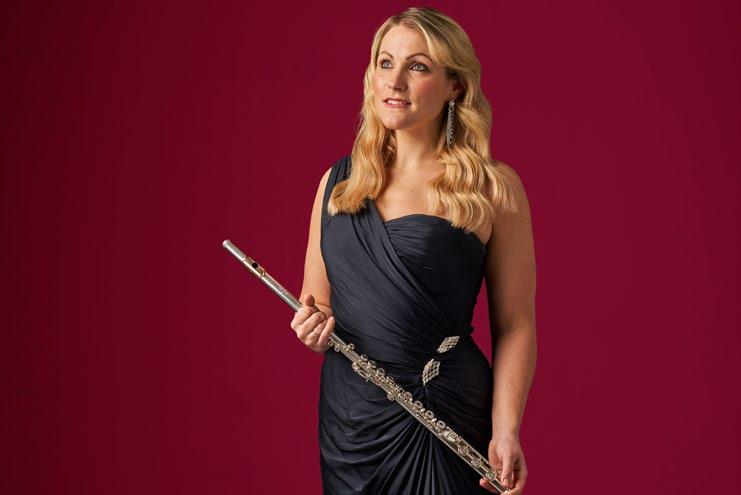
Mrs T Stevenson
Rev N and Mr R Stewart Mrs R F Stewart
Mr and Mrs Struthers
Mr and Mrs B Tait Dr and Mrs T Thomson Mr C Turnbull Dr S Tweedie
Dr Morag Ward
Mr Nelson and Mrs Barbara Waters
Mr W Watters
Dr and Mrs T Weakley Mrs V Wells
Mr G West Miss M Whitelaw
Dr and Mrs D T Williams Mr D Woolgar
Mr R Young Mr C and Mrs L Yule
Thank you to all our members of the Circle, including those who wish to remain anonymous. Every one of you makes a real difference.





RSNO: Scotland’s National Orchestra
Queen
Dame Susan Bruce DBE
CHAIR
John Heasley
HONORARY TREASURER
Kat Heathcote
Linda Holden
Neil McLennan
Costa Pilavachi
Alistair Mackie
Phoebe Connolly
EXECUTIVE ASSISTANT
Nicola Shephard
EXECUTIVE ASSISTANT (MATERNITY LEAVE)
Dr Ingrid Bols
PLANNING OFFICER
Michael Cameron
DRIVER AND DEPUTY STAGE MANAGER
Emma Hunter DEPUTY ORCHESTRA MANAGER
Ewen McKay
HEAD OF ORCHESTRA MANAGEMENT
Jim O’Brien
DRIVER AND ORCHESTRA TECHNICIAN
Richard Payne
LIBRARIAN
Tammo Schuelke
HEAD OF PLANNING
Brodie Smith
CONCERTS ADMINISTRATOR
STAGE AND PRODUCTION MANAGER
Matthias
Van Der SwaaghCONCERTS ASSISTANT
Xander van Vliet
LIBRARY AND ORCHESTRA ASSISTANT
Christine Walker
CHORUS MANAGER
Andrew Stevenson
DIRECTOR OF LEARNING AND ENGAGEMENT
Brianna Berman
PROJECT ASSISTANT
David Robinson
Gurjit Singh Lalli
Jane Wood
Helen Brew
David Hubbard
Dávur Juul Magnussen
Sophie Lang
Paul Philbert
Lorna Rough
Samantha Campbell
HEAD OF LEARNING AND ENGAGEMENT (MATERNITY LEAVE)
Hannah Gardner Seavey
COMMUNITY AND WELLBEING COORDINATOR
Chrissie Johnson PROJECT MANAGER
Rosie Kenneally
LEARNING AND ENGAGEMENT OFFICER (MATERNITY LEAVE)
Rachel O’Connor
CREATIVE ASSISTANT
Rachel Pyke
PROJECT MANAGER
Dr Jane Donald
DIRECTOR OF EXTERNAL RELATIONS
Lisa Ballantyne
PARTNERSHIPS OFFICER
Ian Brooke
PROGRAMMES EDITOR
Rosie Clark
EXTERNAL RELATIONS ADMINISTRATOR
Jessica Cowley
MARKETING MANAGER
Carol Fleming
HEAD OF MARKETING
Constance Fraser
COMMUNICATIONS AND MARKETING OFFICER
Torran McEwan
INDIVIDUAL GIVING AND PARTNERSHIPS OFFICER
Jenny McNeely
HEAD OF INDIVIDUAL GIVING AND PARTNERSHIPS
Mirienne McMillan
SALES OFFICER
Graham Ramage
GRAPHICS AND NEW MEDIA DESIGNER
Cllr Edward Thornley
THE CITY OF EDINBURGH COUNCIL
Company Secretary
Gordon Murray
RSNO COUNCIL
Baroness Ramsay of Cartvale CHAIR
Ms Ruth Wishart
Dr Naomi Stewart
HEAD OF TRUSTS AND PROJECTS
Sam Stone
INFORMATION SERVICES MANAGER
FINANCE AND CORPORATE SERVICES
Angela Moreland
CHIEF OPERATING OFFICER
Abby Dennison
FINANCE ADMINISTRATOR
Alice Gibson
FINANCE ADMINISTRATOR
Ted Howie
FACILITIES COORDINATOR
Lorimer Macandrew
VIDEO PRODUCER
Sam McErlean
SOUND ENGINEERING INTERN
Irene McPhail
ACCOUNTS AND PAYROLL ASSISTANT
Calum Mitchell
VIDEO PRODUCTION INTERN
Hedd Morfett-Jones
DIGITAL MANAGER
Susan Rennie
FINANCE MANAGER
Jade Wilson
FINANCE ASSISTANT
Royal Scottish National Orchestra 19 Killermont Street Glasgow G2 3NX
T: +44 (0)141 226 3868
W: rsno.org.uk
Scottish Company No. 27809 Scottish Charity No. SC010702
/royalscottishnationalorchestra @RSNO @rsnoofficial Youtube.com/thersno
The RSNO is one of Scotland’s National Performing Companies, supported by the Scottish Government.
Orchestra list and programme details correct at time of going to print. Contents © Copyright RSNO and named authors.
